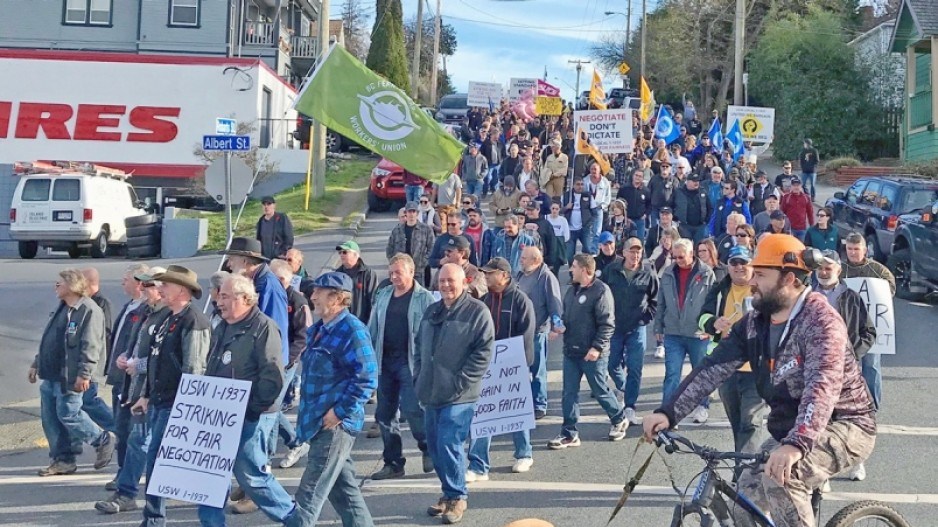Shares and profits are down for Western Forest Products Inc., due largely to a prolonged strike by its unionized workers on Vancouver Island.
The stock and profit plunge come at a time when B.C. forestry companies are shutting down sawmills — due to falling lumber prices, high stumpage costs and American softwood lumber tariffs — and shifting investment dollars to the U.S.
Roughly 3,000 Vancouver Island sawmill workers with the United Steelworkers union have been on strike since the beginning of July, which is when the company’s shares began a downhill slide.
The company’s stock has slid from $1.66 per share July 2 to $1.21 Friday, November 8, following the release of the company’s third quarter results on Wednesday.
Earlier this week, unionized workers rejected a proposal for binding mediation proposed by the company.
“This is a good economy where this company is making millions of dollars and making record profits, and they’re coming to the table with concessions?” Brian Butler, president of Local1-1937 for the United Steelworkers, was quoted as saying in the Nanaimo News Bulletin.
That may have been true in 2017 and 2018, when B.C. forestry companies were indeed raking in record profits, as a result of rising demand and prices for lumber in the U.S.
But the demand and prices for lumber in the U.S. has since fallen, and the company’s third-quarter profits have shrunk by half of what they were in Q3 2018.
The company posted revenues of $292.5 million and profits of $63.9 million in Q3 2018. This year’s third quarter revenues were down by half — to $141.6 million — and the company posted a $17.5 million loss.
"Business on the coast is pretty challenging," Western Forest Products CEO Don Demens told Business in Vancouver. "I think it's self-evident when you look at recent mill closures."
He referred to the announced permanent closure of of the Hammond cedar sawmill in Maple Ridge, and a smaller mill closure in Errington.
Western Forest Products is B.C.'s largest west coast forestry company. It owns six mills on Vancouver Island. Like most other large B.C. forestry companies, it has been investing in the U.S. in recent years, and now owns sawmills in Arlington and Vancouver, Washington. It produces specialty wood products, which are higher value and therefore result in higher tariffs when exported to the U.S., compared with dimensional lumber.
Coastal operators do not face the same problems as their peers in the interior, where the mountain pine beetle and forest fires have eaten up roughly half of the annual allowable cut. The coastal and interiors forestry sectors also have different markets.
The biggest problem for coastal operators is higher operating costs and more challenging terrain for logging. Demens said the industry is also now facing increasing government regulatory burdens. It's also facing stiffer competition in Japan, where the government has introduced subsidies to try to protect its own domestic forestry sector.
Union leaders have said the company is asking for concessions on things like seniority rights that workers are not willing to make. Attempts at mediation have failed. Demens said the company's offer to go to binding arbitration — rejected by the union — shows the company is serious about ending the strike.
"Putting your financial future in the hands of a third party is not something that we take lightly, but I think it's important we get back to work," he said.
A spokesperson for Local 1-1937 could not be reached for comment.



